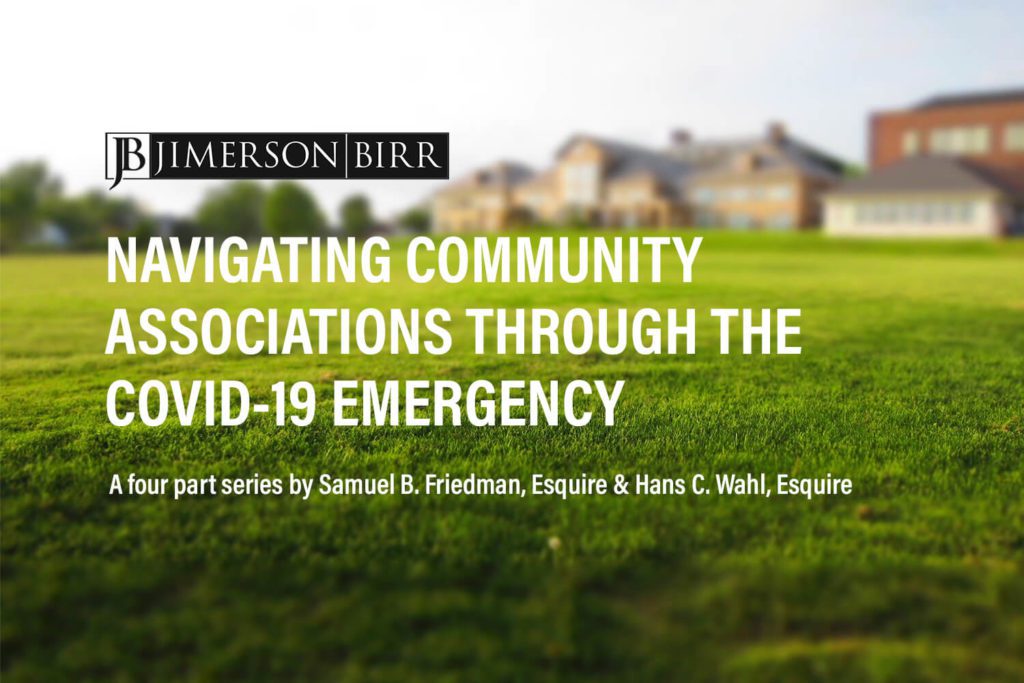Part IV: Common Element Considerations
COVID-19 has affected community associations in various ways, and new obstacles during these times are presenting themselves daily. Community associations will have to deal with many of these developments in stride and are expected to pioneer their communities during the state-wide shutdown. Due to this pandemic and both local/state government stay at home orders and social distancing directives, residents are either (a) working from home; or (b) not working at all, leaving many with no other option than to stay within the community association. This leaves a heightened responsibility on community association boards to ensure the community is functioning to the best of its ability and making decisions with the health, safety, and welfare of its residents in mind. COVID-19 has left community association boards with a plethora of unanswered questions.
This four part blog series is designed to assist community association board members and managers with navigating through this COVID-19 emergency situation. Part I in this blog series addressed the Florida Department of Business and Professional Regulation’s (DBPR) Order that the community association statutory emergency powers are in effect during the COVID-19 Crisis. Part II in this blog series addressed a community association’s ability to conduct meetings during COVID-19. Part III in this blog series addressed a community association’s ability to collect assessments during COVID-19. The final part of this blog series addresses common element considerations, as well as handling non-essential visitors and guests to the association property.
Community Association’s emergency powers are available and in effect during the COVID-19 crisis per the DBPR’s Emergency Order 2020-04. Some of those powers available for both condominium and homeowners’ associations include:
- Based upon the advice of emergency management officials or upon the advice of licensed professionals retained by the board, determine any portion of the “condominium property” [or for HOA’s “association property”] unavailable for entry or occupancy by owners or their family members, tenants, guests, agents, or invitees to protect their health, safety, or welfare.
- Based upon the advice of emergency management officials or upon the advice of license professionals retained by the board, determine whether the “condominium property” [or for HOA’s “association property”] can be safely inhabited or occupied. Stat. § 718.1265(g), (i) and 720.316(g)-(h).
Condominium property under Chapter 718 is defined as both common elements and units. Fla. Stat. § 718.103(13). Therefore, condominium associations do have the power if they so choose to close off the condominium building and units to anyone who is not a unit owner or tenant. The term “association property” is not defined by Chapter 720 but seems to refer to property owned only by the homeowners’ association, and not the individual lots or homes owned by its members. So the authority granted to condominium associations is broader than that granted to homeowners’ associations.
Using these emergency powers, both condominium and homeowners’ associations can close the common areas such as clubhouses, fitness centers, business centers, pools, and athletic courts. If an association takes these measures, it should also post signs to inform its members that the common area property is closed and that any entry during this time will be considered trespassing. Closing the common areas and informing all members of such is to protect the association members from illness during this time. It is also to protect the association and its members from any liability should someone fall ill to COVID-19 while on common property. Common property necessary to access a unit, for example, elevators, parking lots, and staircases, cannot be closed.
During this time, associations can also enact emergency rules and regulations that prevent non-essential guests and visitors from entering the association property in an attempt to minimize exposure to COVID-19. Essential visitors such as emergency first responders or contractors to address an emergency issue, such as a pipe leak, must still be allowed to enter the association property. For vendors who have a current contract with the association, the board should negotiate with its vendors to arrange alternatives while still preserving the contract between the parties if possible.
If an association wishes to implement some of these emergency measures at this time, the board should work with the association’s legal counsel to draft and validly pass the necessary emergency rules and regulations and board resolutions that close the common areas and restrict all non-essential visitors and guests during the declared state of emergency.

